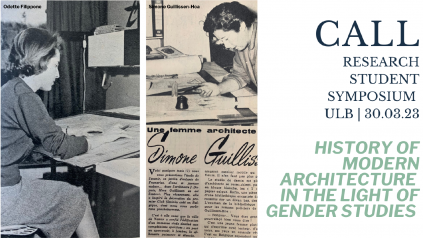Call for abstracts: History of modern architecture in the light of gender studies
SYMPOSIUM | 30.03.2023 | Faculty of Architecture La Cambre-Horta (Université Libre de Bruxelles)
Call for abstracts PhD students (Deadline for submission: 09.01.2023):
History of Modern Architecture in the Light of Gender Studies. Research Student Symposium (30.03.2023)
Download the call in English / Télécharger l’appel en français
The two symposium sessions will be followed by this two lectures:
– Collective listening session of the GEM podcast with researchers Anne-Laure Iger, Alessandra Bruno and Sophie Jacquemin (ULB) Alternative narratives, methodologies and perspective in the practice of architecture
Episode 1
– Lecture by Lucía C. Pérez Moreno (KULeuven+UniZar) : Women in Spanish Architectural
Periodicals: Patriarchal Tradition, Benevolent Sexism, and the Authority Gay.
In 1977, the exhibition Women in American Architecture: A Historic and Contemporary Perspective at the Brooklyn Museum of New York City showcased the work of female architects for the very first time. Following that idea of a materialist feminism – but with liberal methodology and the willingness to highlight women’s work -, a few associations and collectives (Beverly Willis Architecture Foundation, RebelArchitette, etc.) saw the light of day, as well as numerous publications (Lori Brown (Bloomsbury Global Encyclopaedia of Woman in Architecture, to be published soon), Despina Stratigakos (Where Are the Women Architects?, 2016), Jane Hall (Breaking Ground: Architecture by Women, 2019), Jan Cigliano Hartman (The Women Who Changed Architecture, 2022), Stéphanie Bouysse-Mesnage.
From the end of 1980s in the United States, a new generation of architects emerged in the context of a new university paradigm inclined towards transdisciplinarity, with the creation of the new academic contents of “Studies”. Beatriz Colomina, Mark Wigley, Joel Sanders or Mary McLeod, among others, suggest a new approach to architecture and its subjects, developing an interest in minorities (gender, race, sexual orientation, etc.) as well as other elements (magazines, journals, exhibitions, etc.). This team of researchers criticized standardization, hegemony, universality, and architecture stereotypes, implying to change our perspective on architecture.
The history of modern architecture in the light of gender was shaped by the meeting of these two important heritages of the discipline. In 1998, the reference book Women and the Making of the Modern House (Yale University Press, 1998) by Alice T. Friedman, offered a new articulation between architecture and gender, specifically applied to modernism. In Belgium, from the beginning of the 2000s, Hilde Heynen laid the foundations for research in the history of modern architecture in the light of gender studies with the book Negotiating Domesticity: Spatial Productions of Gender in Modern Architecture (Routledge, 2005). Shortly after that, there was a significant decrease in the production of work about this topic. However, for over a decade now, research has known a revival, with new names such as Patrick Rössler & Elizabeth Otto (Bauhaus Women: A Global Perspective, 2019), Stéphanie Dadour (Du féminisme en architecture, 2020), Lucía C. Pérez Moreno, Florencia Fernandez Cardoso, as well as new academic projects – MoMoWO (2014-2018), Wiki Women Design (2020-2021). New tools have been multiplying: subjective constellations, voices of otherness, female gaze and male gaze, queer architecture, etc. These tools give new narratives of the history of modern architecture and the architects who contributed to it.
Hortence lab of the Faculty of Architecture of La Cambre-Horta (Université Libre de Bruxelles) offers to young researchers a Research Student Symposium on the history of modern architecture in the light of gender studies to discuss and exchange on the following questions: how to articulate methodologies, tools and research from gender studies – and more broadly from queer studies as well as postcolonial studies – to those of architectural history in a multidisciplinary and innovative academic approach? How can gender studies bring out other ways of making history, of writing history? How can a feminist reading of modern architecture shift the focus on the social construction of architecture and its history? How to give voice to historical figures such as women, queer or lesbian architects of the modernist period to make other voices heard? How to question the values of the construction of architectural history? What are the permeabilities between architectural practice, modern architectural history, and gender studies? What have been – and are – the places where questions of gender, modernity, architecture and history have met or come into friction? More broadly, how can we consider gender studies in architectural theory, criticism and practice today?
We wish to articulate architectural research with broader political and social concerns in a historical practice of counter-memory, in an intersectional perspective and with the aim of valuing each stage of the architectural process (building sites, participation, pedagogy, architecture magazines, etc.), each profession and everyone involved in the process, as well as every program/concept – from the Droixhe’s buildings concept of care (Gloesener, 2021) to Eileen Gray’s queer villa (Marchal, 2022).
Research from disciplines such as art history, anthropology, sociology, literature, design, geography, and planning are welcome. Research methods may include oral histories and interviews, archives, (auto)ethnography, participatory and mediation methods, social networks, mass media, and digital technologies. Critical re-readings of feminist rhetoric are also welcome. Submissions that highlight narratives of gender, sexuality, race, nonconformity in the broadest sense, and that provide a platform for voices of minority and alterity are particularly encouraged. This symposium will welcome contributions interested in these questions and will explore the practical and ethical limits of such research.
How to submit your abstract?
Your abstract – in French or English – needs to be sent in PDF format to apolline.vranken@ulb.be for January 9, 2023 (included).
The selected abstracts will be the subject of a 15 min oral presentation during the workshop, followed by 15 min of discussion and exchanges.
Planning
January 9, 2023 : Deadline for submission of abstract
January 23, 2023 : Selection of abstracts
March 30, 2023 : Research Student Symposium (oral presentations : morning FR and afternoon EN)
If you have any questions/comments, please do not hesitate to contact apolline.vranken@ulb.be.
source: hortence.com




